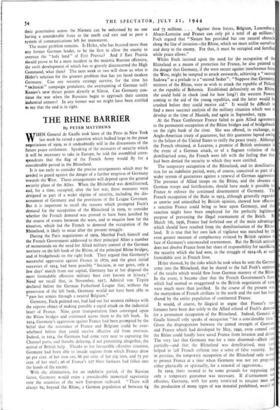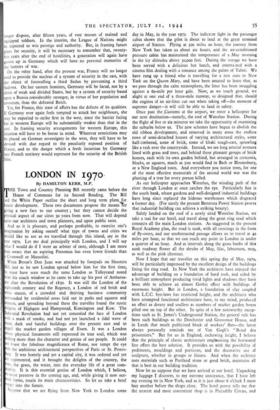THE RHINE BARRIER
By PETER MATTHEWS
WHEN General de Gaulle took leave of the Press in New York last week he raised a question which bulked large in the peace negotiations of 1919, as it undoubtedly will in the discussions of the future peace settlement. Speaking of the measures of security which it will be necessary to take in Europe, he told the assembled corre- spondents that the flag of the French Army would fly for a considerable period in the Rhineland.
It is too early to consider the precise arrangements which may be nettled to guard against the danger of a further eruption of Germany towards the West. Those arrangements will depend upon the general security plans of the Allies. When the Rhineland was demilitarised, and, for a time, occupied, after the last war, these measures were designed as part of a wider regime of security, including the dis- armament of Germany and the provisions of the League Covenant. But it is important to recall the reasons which prompted Foch's demand for the occupation of the Rhineland in 1919, to consider whether the French demand was proved to have been justified by the course of events between the wars, and to enquire how far the situation, which led the French to demand the occupation of the Rhineland, is likely to recur after the present struggle.
During the Paris negotiations of 1919, Marshal Foch himself and the French Government addressed to their principal Allies a number of memoranda on the need for Allied military control of the German territory on the left bank of the Rhine, of the principal Rhine bridges, and of bridgeheads on the right bank. They argued that Germany's • successful aggression against France in 1870, and the great initial successes of 1914, had been possible " because, at our gates, only a few days' march from our capital, Germany has at her disposal the most formidable offensive military base ever known in history." Need we recall that, in November, 1917, Admiral von Tirpitz declared before the German Fatherland League that, without the possession of the left bank, Germany would not have been able to " pass her armies through a neutral Belgium."
Germany, Foch pointed out, had laid out her western railways with the express object of making possible a rapid attack on the industrial heart of France. Nine, great transportation lines converged upon the Rhine bridges and continued across them to the left bank. In 1914, Germany's aggression against France had been prompted by the belief that the resistance of France and Belgium could be over- whelmed before they could receive effective aid from overseas. Indeed, in 1914, the Germans had come very near to capturing the Channel ports, and thereby delaying, if not preventing altogether, the arrival of British help. Thanks to her favourable offensive situation, Germany had been able to invade regions from which France drew 90 per cent. of her iron ore, 86 per cent. of her pig iron, and 75 per cent. of her steel ; 96 of France's 127 blast furnaces had fallen into the hands of the enemy.
With the, elimination, for an indefinite period, of the Russian factor, Germany would enjoy a considerable numerical superiority over the countries of the west European seaboard. " There will always be, beyond the Rhine, a German population of between 64 and 75 . . . Against these forces, Bdgium, Luxemburg Alsace-Lorraine and France can only pit a total of 49 millions.' Foch argued that " Nature has provided but one natural obstacle along the line of invasion—the Rhine, which we must utilise ourselves and deny to the enemy. For that, it must be occupied and fortified while peace allows."
Whilst Foch insisted upon the need for the occupation of the Rhineland as a means of protection for France, he also pointed to the danger that Germany, if she were secure against interference from the West, might be tempted to attack eastwards, achieving a " Second Sadowa" as a prelude to a "second Sedan": "Suppose that Germany, mistress of the Rhine, were to wish to attack the republic of Poland or the republic of Bohemia. Established defensively on the Rhine, she could hold in check (and for how long?) the western Powers coming to the aid of the young republics, and the latter would be crushed before they could receive aid." It would be difficult to find a more succinct analysis of the military situation which was to develop at the time of Munich, and again in September, 1939.
At the Peace Conference France failed to gain Allied agreement to the permanent occupation of the Rhine bridges and of bridgeheads on the right bank of the river. She was offered, in exchange, an Anglo-American treaty of guarantee, but this guarantee lapsed owing to the failure of the United States to ratify the peace treaty. Although the French obtained, at Locarno, a promise of British assistance in the event of a German attack, or of a flagrant violation of the demilitarised zone, the French were left with the feeling that they had been denied the security to which they were entitled.
The temporary occupation of the Rhineland, and its demilitarisa. tion for an indefinite period, were, of course, conceived as part of a wider system of guarantees against a renewal of German aggression The presence of Allied troops on the Rhine, and the absence of German troops and fortifications, should have made it possible for France to enforce the continued disarmament of Germany. The French occupation of the Ruhr in 1923, although generally regarded as unwise and unjustified by British opinion, showed how effective a sanction France could bring to bear upon Germany, and that sanction might have been employed for the perfectly legitimate purpose of preventing the illegal rearmament of the Reich. B March 7th, 1936, France had forfeited one of the main advantages which should have resulted frost the demilitarisation of the Rhine- land. It is true that her own lack of vigilance was matched by the even greater measure of complacency evinced by British opinion in face of Germany's unconcealed rearmament. But the British attitude does not absolve France from her share of responsibility for sacrificing the security which she had won, in the struggle of 1914-18, at such formidable cost in French lives.
Hitler showed, by the risks which he took when he sent the German army into the Rhineland, that he shared to the full Foch's estimate of the results which would flow from German mastery of the Rhine In the event, it became clear that the French Government's fears, which had seemed so exaggerated to the British negotiators of 1919, were much more than justified. In the course of the present war, the martyrdom of French civilians in the north and the east has been shared by the entire population of continental France.
It would, of course, be illogical to argue that France's mis- fortunes have been due solely to the Allied refusal of Foch's demand for a permanent occupation of the Rhineland. Indeed, General d Gaulle himself only speaks of occupation "for a considerable time. Given the disproportion between the armed strength of Germany and France which had developed by May, 1940, even control over the Rhine could hardly have saved France from invasion and defeat The very fact that Germany was for a time disarmed—albeit 0111Y partially—and that the Rhineland was demilitarised, may have helped to lull French opinion into a sense of false security. But, in practice, the temporary occupation of the Rhineland only served to protect France at a time when Germany was not yet prepare either physically or spiritually, for a renewal of aggression._ In 1919, there seemed to be some grounds for supposing di only a temporary guarantee was necessary. If disarmament vas effective, Germany, with her army restric:ed to ioo,000 men a the production of many types of war material prohibited, would
longer dispose, after fifteen years, of vast masses of trained and equipped soldiers. In the interim, the League of Nations might be expected to win prestige and authority. But, in framing future plans for security, it will be necessary to remember that, twenty- five years after the end of hostilities, a generation will again have grown up in Germany which will have no personal memories of the horrors of war.
On the other hand, after the present war, France will no longer need to provide the nucleus of a system of security in the east, with the object of forestalling a third Sedan by preventing a third Sadowa. On her eastern frontiers, Germany will be faced, not by a chain of weak and divided States, but by a system of security based pon a Russia considerably stronger, in virtue of her population and resources, than the defeated Reich.
Yet, for France, this state of affairs has the defects of its qualities. If Germany ever again feels tempted to attack her neighbours, she may be expeCted to .strike first in the west, since the barrier facing er in western Europe will be substantially weaker than that in the east. In framing security arrangements for western Europe, this tuation will have to be borne in mind. Whatever restrictions may e placed on German sovereignty in the west, they will have to be evised with due regard to the peculiarly exposed position of ante, and to the danger which a fresh incursion by Germany nto French territory would represent for the security of the British sles.























 Previous page
Previous page